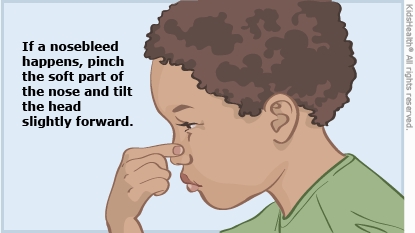How to Handle Nosebleeds
Nosebleeds are common in kids and usually aren't serious. Most stop on their own and can be cared for at home.
Nosebleeds happen more often in winter and when the air is dry.
What Should I Do if My Child Has a Nosebleed?
- Stay calm and reassure your child.
- Have your child sit up with their head tilted slightly forward over a sink, pail, or towel. Do not have your child lean back — this may cause gagging, coughing, or vomiting.
- Pinch the soft part of the nose at the bottom of the nostrils for at least 10 minutes.

When Should I Call the Doctor About a Nosebleed?
Call the doctor if your child has a nosebleed and:
- has blood in the back of the throat even when leaning forward
- may have put something in the nose
- recently started a new medicine
Also call if your child bruises easily, has heavy bleeding from minor wounds, or gets nosebleeds often.
Get Emergency Medical Care if Bleeding:
- is heavy
- happens along with dizziness or paleness
- continues after two times of applying pressure for 10 minutes each
- is the result of a blow to the head or a fall
What Can Help Prevent Nosebleeds?
Keep the inside of your child's nose moist with saline (saltwater) nasal spray or gel, or dab petroleum jelly or antibiotic ointment gently around the opening of the nostrils. You also can use a humidifier in your child's bedroom. Discourage nose picking and keep kids' fingernails short.



